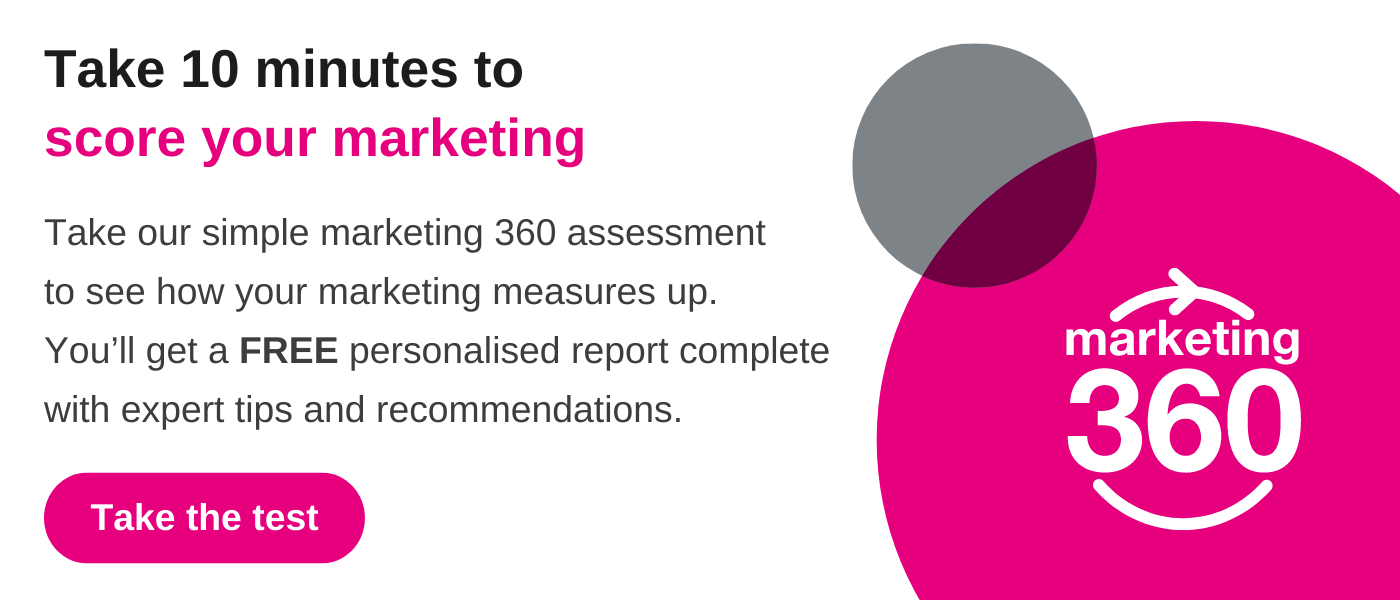Modern marketing is multi-faceted and increasingly specialised. It’s rare for an in-house team to be able to run the full gamut of branding, web design, SEO, digital marketing, PR, events, content and paid media without relying on some kind of outside support. This can come in many forms, including freelancers and consultants, and marketing agencies.
Outsourcing your marketing will help you tap into specialist skill sets that you otherwise wouldn’t have. They can also help you stay focussed on your core business while expanding your range of marketing activity.
But finding the right partner isn’t always easy. Should you work with an individual or do you need a team? Do you want a specialist agency, or a full-service one? And once you’ve decided what kind of agency you’re after, how do you find the one that’s right for you?
In this post, we’ll explore what your options are, how to create a shortlist of marketing agencies and how to manage the pitch process.
Understand your goals
Before you start to look around, you should be able to answer these fundamental questions:
What results am I looking for from my marketing?
Every business owner wants more leads. But your goals for outsourcing marketing need to be more detailed to ensure the partnership delivers. What are you hoping to achieve? For example:
- Build brand awareness. Building brand awareness enables people to become familiar with your brand. This, in turn, means they’re more likely to recognise your brand and differentiate it from your competitors. The ultimate goal is to embed your brand into prospects’ consciousness, so that they become not just customers, but loyal repeat customers.
- Establish thought leadership. You want to be seen as the authority in your field and attract customers who will benefit from your guidance. To achieve this, your content must reflect your unique perspective and in-depth knowledge.
- Attribute revenue. If you’re unsure which of your marketing tactics generates revenue, you need to track and measure the success of your initiatives. This means you can tweak and optimise your activity and improve your marketing ROI.
You should also define when you want to see results, and how much you’re willing to spend. Timelines and budgets don’t have to be exact, but ballpark costs and deadlines will help you choose between partners and guide conversations.
Why do I need outside marketing help to achieve this?
If you’re a small business, having an in-house marketing team that includes the full suite of necessary skills isn’t likely to be viable. And even for larger companies, there are several reasons why outsourcing your marketing is the right route:
- It’s difficult to hire talented marketers. Many businesses are investing in their marketing post-pandemic. This means marketers are in demand and good ones are like gold dust. This lengthens an already challenging hiring and onboading process, which can delay your marketing initiatives.
- Your objectives have an end point. Say you want to raise awareness of a new product. You need branding and messaging support and someone to execute a promotional campaign. That has a fixed timeline and budget. Hiring a permanent employee means they focus on only one task for, say, six months and when it’s done you have to keep on paying their salary.
- You need an outside perspective. Just because you view your offerings a certain way doesn’t mean your customer will. You might need to shift perspectives and adjust your messaging, which can be difficult when you’re accustomed to communicating about your brand in a certain way. Working with an experienced marketing director brings an external perspective. They can help you separate your view of the company from your customers’. And in turn, you can talk to your ideal customer about their pain points in a language they understand.
- You want to hit the ground running. Even if you do succeed in hiring marketing professionals, getting them up to speed might prove difficult. But when you outsource to a part-time marketing director or agency, you get seasoned individuals who thrive in new environments.
Marketing consultants vs marketing agencies
There are pros and cons to both.
- Freelancers and consultants tend to be cheaper than agencies. They’re useful for solving specific problems or achieving specific results. That said, they tend to require more management than an agency would. Working with multiple freelancers on a project can become complex and time-consuming.
- Agencies are usually more expensive. But, they can provide a complete service, including account handlers or project managers who make life easier for you. They may also be able to roll multiple disciplines (such as web design and content creation) into one offering, meaning you don’t have to deal with as many people.
You’ll also want to consider whether you want a partner who is local or whether you’re happy for them to work remotely. Local partners will limit your options, but you might prefer face-to-face interactions as opposed to video calls. And, since the pandemic, you might find even those partners closer to home will prefer to remote working. So, be sure to have a conversation around their expectations on this matter before making any decisions.
It’s also useful to think about the duration and eventual scope of the project. Ask yourself the following:
- Is this a quick job with specific deliverables?
- Is this a long-term, strategic partnership that will expand into other areas?
- Do you want a partner who can transfer skills over to your team while the work is ongoing?
Once you’re clear on your own goals and preferences, it’s time to create a shortlist of agencies and consultants, and kick off the pitching process.
But, there is a third option: the portfolio CMO. Our experienced marketing directors will embed themselves in your business from strategy creation to implementation. They’ll help you build the right mix of talent you need for your marketing teams, and this includes selecting agencies. In fact, they often have a list of agencies they’ve worked with successfully in the past, and can choose one suited to your specific business needs and culture.
Creating a shortlist of marketing agencies
It’s great to have contacts that you’ve worked with in the past, but you shouldn’t limit your options to your existing network.
Referrals are a time-honoured way to find trusted suppliers. Focus on referrals that come from people who’ve worked with someone and seen good results. LinkedIn is a good place to reach out.
Award wins are also a good indicator. But make sure that the awards are relevant to your goals and/ or your sector.
And search for agencies with case studies that relate to your sector or your desired results. Working with someone who already understands your field can save you a lot of time during the briefing process.
When reviewing case studies, focus on specific results and KPIs. Agencies with impressive stats will showcase them every chance they get. Agencies that are vague about their impact, citing results like ‘growth in traffic’, probably didn’t make much of an impact.
Choosing an agency is just as important as making a hire. As such, one bad decision could be costly in the long run. Don’t be afraid to ask for references to help you make a decision. Then, create a shortlist of three to five agencies. And never settle for the first partner that you find.
Managing the pitching process
There are two types of ‘pitch’.
The first is a detailed response to a specific brief you set. This is on-spec work the agency created to win your business. This kind of pitch is appropriate for larger projects with bigger budgets. In some cases, agencies may expect to be paid for this.
For smaller projects, agencies will often prepare a more general presentation that introduces their business and talks in a general way about how they can help you achieve your goals. Agencies will usually do this for free as part of the new business process.
In either case, you must supply a clear brief well in advance of the meeting. Without this, the discussion will lack focus and you’ll probably need another meeting to make a decision.

Agencies will often ask additional questions as part of the pitch process. And they can be illuminating. Consider the following:
- Are they asking sensible questions?
- Is the interaction easy or strained?
- Do they seem confident and organised (or does it feel a bit chaotic)?
Make sure the people who will run the account attend the pitch meeting. You want to get a feel for the day-to-day team, as opposed to the hotshot Creative Director who will dazzle you in the pitch but who you’ll never see again.
As part of your brief, you may want to set a task so the agency can demonstrate their skills and experience. Alongside their response, ask them to explain their reasoning. How people think is just as important as what they think.
Let the agencies know how long they have to present their pitch. And provide guidance for the kinds of questions you’re likely to ask them in the room. Example questions may include:
- Why do they want to work with you?
- Do they view this as a transactional project or a long-term partnership? If long-term, will they be willing to make an investment upfront in the relationship (usually in the form of lower fees)?
- How will they handle day-to-day communications?
- What other services do they have that may be useful in the future?
Making the right decision
Try to hold all your pitches on the same day, as this will help you make direct comparisons. You should also aim to make a decision by the end of that day, if possible. First impressions are important and leaving the decision too long can affect your judgement.
When making comparisons, try to evaluate each agency based on the same criteria. And make sure that the people you’re basing your decisions on are the ones who will be doing the work. Agencies will often roll out senior staff who are great presenters for pitches. If those people aren’t going to be responsible for your marketing efforts, that’s worth taking into account.
Also, ask your receptionist and more junior staff their impressions of the pitch team. This will give you an indication of what they’re like when you’re not around.
Consider who their clients are. If an agency has a lot of high-profile brands on their roster, that can be a good thing. But you don’t want your account to be overshadowed. Being a big fish in a small pond will work to your advantage, too. A small agency who really prizes your work may produce better results than a large agency who sees you as ‘small fry’.
And, last but not least, ask each agency for references from at least two current customers.
Investing time and effort in finding the right agency will pay back dividends when the work begins. Understanding your own goals, researching your options, and running an effective pitching process will help you separate the agencies you want to work with from those you don’t. After all, changing agencies is time-consuming and disruptive for everyone involved. Putting the effort in upfront will make you more likely to find a partner that you can build a long-term, mutually-beneficial relationship with for years to come.




